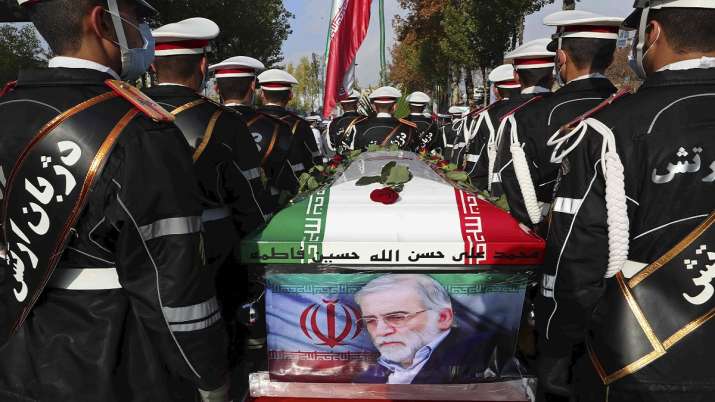
Military personnel stand near the flag-wrapped coffin of Mohsin Fakhrizadeh, a scientist killed on Friday, Monday, November 30, 2020, during a funeral ceremony in Tehran, Iran, in this photo released by the official website of the Iranian Defense Ministry.
Highlight
- Iran orders US government to pay $4 billion to families of nuclear scientists killed in targeted attacks
- Court Refers to Israel, Says US Supports “Zionist Regime” in Its “Organized Crime” Against Victims
- Families of 3 nuclear scientists killed in targeted killings file suit in Tehran
An Iranian court on Thursday ordered the United States government to pay more than $4 billion to the families of Iranian nuclear scientists who have been killed in targeted attacks in recent years, state media reported.
The largely symbolic regime underscores rising tensions between Iran and the West over Tehran’s fast-moving nuclear program, with talks to restore the broken nuclear deal to a standstill.
Although Tehran has in the past blamed Israel for targeted killings of Iranian nuclear scientists since a decade ago, Iran did not directly blame its arch enemy Israel in its announcement. Iran has not recognized Israel since the 1979 Islamic Revolution, which removed the pro-West monarchy and brought Islamists to power.
The court mentioned Israel only in saying that the US supports the “Zionist regime” in “organized crime” against victims.
It is unclear whether the court’s ruling, as in previous Iranian cases against the US, will gain traction as both sides engage in a spiraling escalation of threats; There is no US property to be confiscated in the Islamic Republic.
Nevertheless, the court branch, which is dedicated to reviewing Iranian complaints against the US, summoned 37 former US officials, including former Presidents Barack Obama and Donald Trump, as well as former Secretary of State Mike Pompeo, former Iran envoy Brian Hook . Former Defense Secretary Ashton Carter.
Trump withdrew from the nuclear deal in 2018 and imposed tough economic sanctions on Iran, eliminating most of its oil revenues and international financial transactions.
President Joe Biden wanted to return to the deal, but talks have stalled in recent weeks over the US designating Iran’s paramilitary Revolutionary Guard as a terrorist organization.
Meanwhile, Iran is already enriching uranium near weapons-grade levels under dwindling international oversight. Earlier this month, Iran removed 27 surveillance cameras from the UN’s International Atomic Energy Agency, in what its director warned could be a “fatal blow” to the nuclear deal.
The families of three nuclear scientists killed in the targeted killings, as well as a nuclear scientist injured in an attack, filed suit in Tehran, the country’s state-run IRNA news agency reported without identifying the plaintiffs. The court ordered that the US pay $4.3 billion in total compensation, including fines.
Iran and Israel are locked in a shadow war in the Middle East and its waters. The conflict has recently escalated with suspected targeted killings of Iranian nuclear scientists and military officials. In late 2020, Iran blamed Israel for killing its top nuclear scientist, Mohsen Fakhrizadeh, with a remote-controlled machine gun while traveling in a car outside Tehran.
Iran has imposed sanctions on prominent US political and military officials for alleged “terrorism” and “human rights violations” in retaliation for the US killing of Iran’s top commander Qasem Soleimani two years ago.
Read also | India denies claims of Iran minister raising ‘Prophet Mohammad’ issue